Choosing the right dumpster size is crucial for efficiently managing waste during your project, whether it’s a home renovation, construction job, or simple cleanout. At Simplified Dumpster, we understand the importance of selecting the perfect container size based on your specific project needs.
Located at 5501 S Cedar St, Lansing, MI 48911, our team is ready to help you determine the ideal roll-off dumpster size. You can reach us at (517) 329-1234 during our business hours: Mon: 7 AM-5 PM, Tues-Fri: 7:30 AM-5 PM, Sat: 9 AM-12 PM.
Our dumpster rental service offers a variety of dumpster sizes with different dimensions and weight capacities to accommodate projects of all scales. Understanding the basics of dumpster sizing will help you avoid additional fees from overloading or renting a larger container than necessary.
Key Takeaways
- Selecting the right dumpster size is crucial for efficient waste management.
- Our team at Simplified Dumpster helps determine the perfect container size based on your project needs.
- We offer various dumpster sizes to accommodate projects of all scales.
- Understanding dumpster sizing basics helps avoid additional fees.
- Contact us during business hours to discuss your waste removal needs.
Understanding Dumpster Sizes and Capacities
Understanding dumpster sizes and capacities is essential to avoid additional costs and ensure a smooth project execution. When renting a dumpster, it’s not just about picking a size that fits your needs; it’s also about understanding the weight limits and capacities associated with each dumpster size.
Standard Dumpster Dimensions
Dumpster dimensions can vary among rental companies, but there are standard sizes that most providers adhere to. Typically, dumpster sizes are measured in yards, referring to the volume of waste the container can hold. Common sizes range from 10 to 40 yards, with varying dimensions for length, width, and height.
Volume Measurement Explained
The volume of a dumpster is measured in cubic yards, which represents the amount of waste it can hold. To estimate your waste volume, consider the type and quantity of materials you’ll be disposing of. This helps in selecting a dumpster that can accommodate your project’s waste without exceeding its capacity.
Weight Capacity Considerations
Every dumpster rental comes with a specific weight limit that varies based on the container size and local regulations. Exceeding this limit can result in additional fees. It’s crucial to understand the density of your waste materials to choose a dumpster with an appropriate weight capacity. Heavy materials like concrete can quickly push your dumpster over its weight limit, incurring extra costs.
- Be aware of the weight limit for your chosen dumpster size to avoid extra charges.
- Mixing heavy materials with lighter ones can help manage the overall weight.
- Some rental companies offer specialty dumpsters for heavy materials, adjusting the weight limits accordingly.
Small Dumpster Options: 10-15 Yard Containers
Selecting the appropriate dumpster size for your small project can help streamline your waste disposal process. For small dumpster rentals, 10-15 yard containers are often the go-to choice for minor renovations, cleanouts, and other small projects.
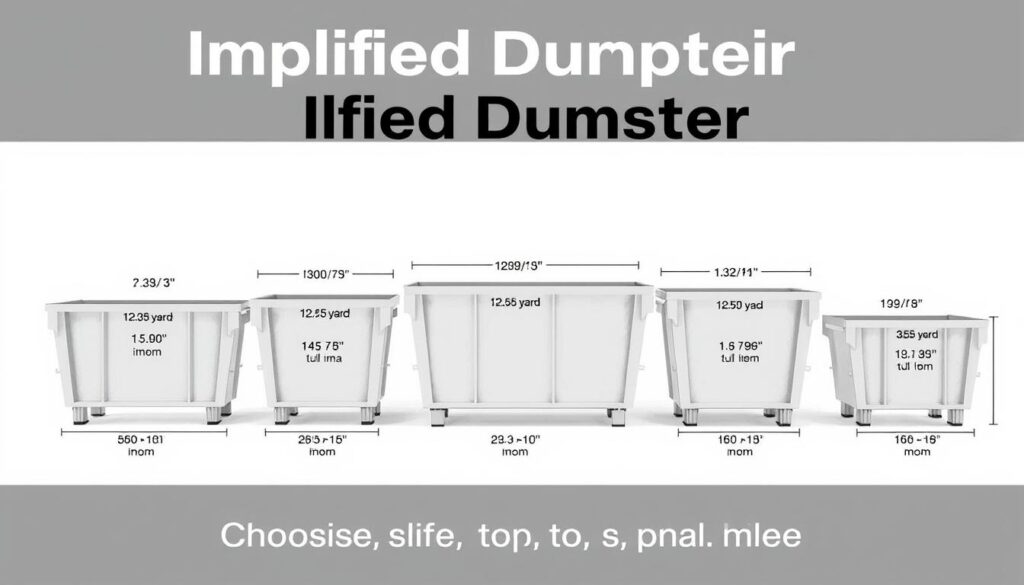
10 Yard Dumpster Uses and Capacity
A 10 yard dumpster is ideal for small cleanouts, such as garage or attic cleanups, holding about 50-60 trash bags or roughly 2-3 pickup truck loads.
12 Yard Dumpster Applications
The 12 yard dumpster is versatile, suitable for bathroom remodels, small roofing repairs, and moderate landscaping projects, with a capacity of around 60-70 trash bags.
15 Yard Dumpster Benefits
The 15-yard dumpster represents an excellent middle ground for residential projects. It’s perfect for bathroom remodels, roofing repairs on smaller homes, and moderate landscaping projects, holding approximately 80-100 trash bags or 4.5 pickup truck loads.
Medium Dumpster Options: 16-20 Yard Containers
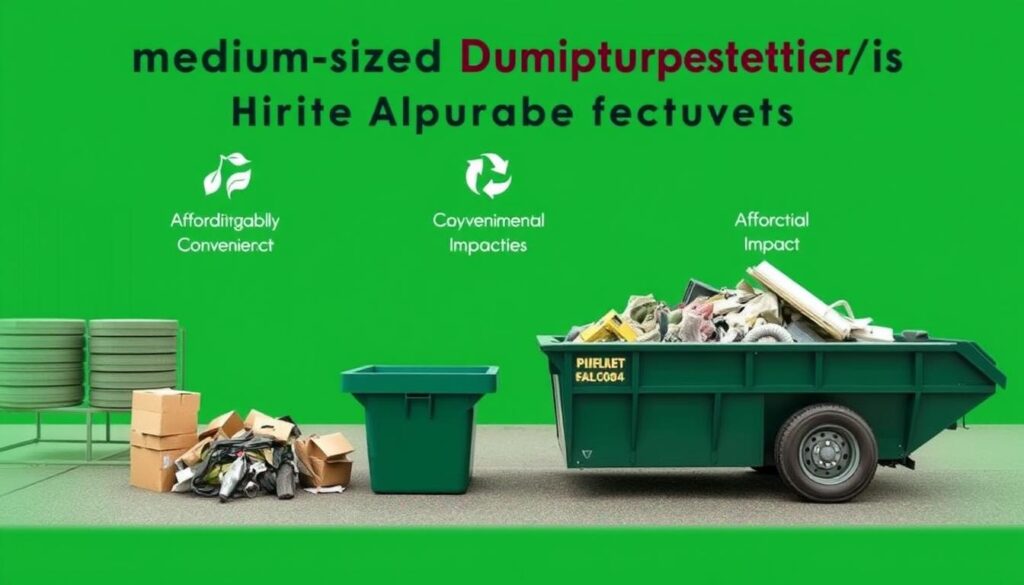
Medium dumpster rentals offer a versatile solution for various home renovation and construction projects. These containers are ideal for projects that generate a substantial amount of waste but don’t require the largest dumpsters available.
16 Yard Dumpster Specifications
A 16 yard dumpster is a popular choice for many projects, offering a compact size that’s perfect for smaller renovation tasks. It’s suitable for residential areas with limited space.
20 Yard Dumpster Versatility
The 20 yard dumpster provides extra capacity for larger construction projects. Its versatility makes it suitable for a wide range of waste removal needs, from kitchen renovations to deck demolitions.
Best Projects for Medium-Sized Dumpsters
Medium-sized dumpsters (16-20 yards) are ideal for:
- Whole-house flooring replacements
- Kitchen renovations
- Moderate-sized deck demolitions
- Multi-room remodeling projects
- Residential siding replacement projects
These projects benefit from the balance between capacity and size that medium dumpsters provide, making them a practical choice for both DIY homeowners and professional contractors handling removal projects.
Large Dumpster Options: 30-40 Yard Containers
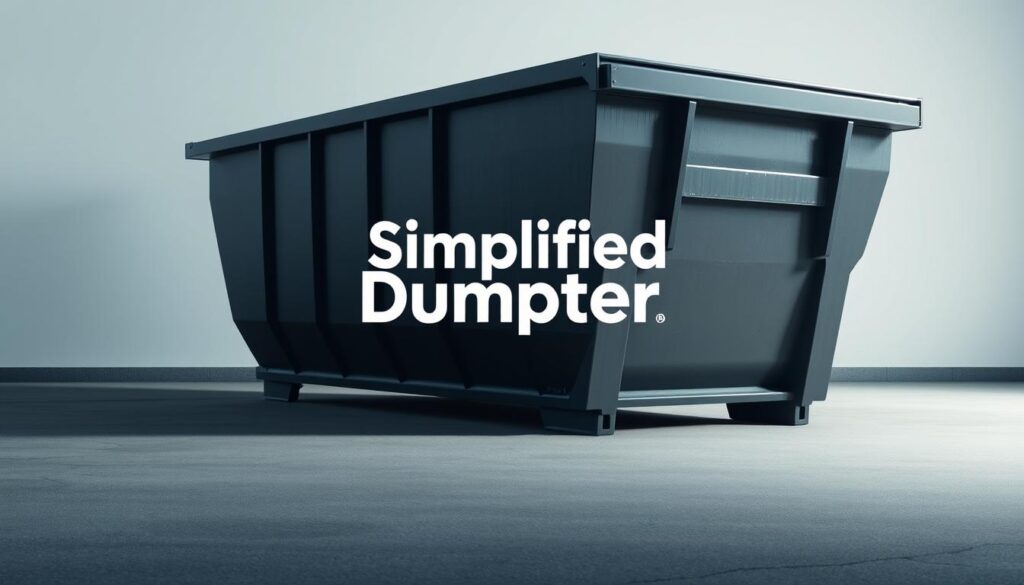
For projects generating a significant amount of waste, 30-40 yard dumpsters offer the capacity needed for efficient waste management. Large dumpsters are commonly used for both commercial and residential projects that produce substantial amounts of waste.
Capabilities of 30 Yard Dumpsters
A 30-yard dumpster is ideal for projects that require a significant amount of waste disposal, such as major home renovations or commercial cleanouts. These dumpsters provide ample space for disposing of construction debris, household items, and other materials.
Applications of 40 Yard Dumpsters
The 40-yard dumpster is the largest size available for most rental services, making it perfect for large-scale construction projects or major demolition jobs. It’s also beneficial for businesses looking to clear out large facilities or for residential projects involving extensive renovations.
Commercial vs. Residential Large Dumpster Usage
While both commercial and residential projects benefit from large dumpster rentals, there are key differences in their applications. Commercial projects often have more space available for dumpster placement, whereas residential projects may require more careful planning due to space constraints. Nonetheless, both settings benefit from the substantial capacity these dumpsters provide.
Matching Dumpster Size to Project Type
Your project’s specific needs will dictate the appropriate dumpster size for efficient waste management. Different projects generate varying amounts and types of waste, making it crucial to choose a dumpster that can accommodate your needs.
Home Renovation Projects
For home renovation projects, you’ll likely need a dumpster that can handle construction debris, such as drywall, flooring, and roofing materials. A 10-20 yard dumpster is often suitable for smaller renovations, while larger projects may require a 20-30 yard dumpster.
Construction and Demolition Needs
Construction and demolition projects typically generate a significant amount of waste, including heavy materials like concrete and brick. For these projects, a 20-40 yard dumpster is often necessary to handle the volume and weight of the debris.
Yard and Landscape Cleanups
For yard and landscape cleanups, you’ll need a dumpster that can accommodate organic waste, such as branches, leaves, and soil. In Florida, specialty dumpsters for yard waste removal are available. The size of the dumpster you’ll need depends on the scope of your project:
- Spring and fall yard cleanups typically require 10-20 yard dumpsters, depending on property size and waste volume.
- Major landscaping overhauls involving soil removal and vegetation clearing may require 20-30 yard containers.
- Tree removal projects benefit from dedicated yard waste dumpsters that can accommodate branches and trunks.
Estimating Waste Volume for Your Project
Accurately estimating waste volume is crucial for selecting the right dumpster size for your project. This step helps prevent overfilled dumpsters and additional fees for excess materials. To make an informed decision, consider the type and quantity of debris your project will generate.
Using the Trash Bag Measurement Method
You can estimate your waste volume by measuring the size of your trash bags. For example, a standard 13-gallon trash bag is approximately 0.05 cubic yards. By counting the number of bags filled, you can calculate the total volume of waste.
Calculating Debris by Project Type
Different projects generate varying amounts and types of debris. For instance, a home renovation project may produce a mix of construction materials, while a yard cleanup might generate mostly organic materials. Understanding your project’s specific needs will help you estimate the required dumpster size.
Common Estimation Mistakes to Avoid
When estimating waste volume, avoid common mistakes like underestimating the total volume or failing to account for the weight of dense materials like concrete or dirt. Separating heavy materials from lighter debris can provide more cost-effective disposal. Additionally, consider the timeline of waste generation to optimize your dumpster rental period.
- Underestimating total waste volume can lead to overfilled dumpsters and extra fees.
- Failing to account for dense materials can result in exceeding weight limits.
- Not considering the project timeline can lead to unnecessary rental periods.
Weight Limits and Overages: What You Need to Know
When renting a dumpster, it’s essential to be aware of the weight limits and potential overages. Exceeding these limits can result in additional charges, which can be avoided with proper planning.
Understanding Weight Restrictions
Dumpster rental companies typically have weight limits for their containers, ranging from a few tons to over 10 tons, depending on the size and type of dumpster. It’s crucial to understand these limits to avoid excess weight charges.
Heavy Materials Considerations
Certain materials like concrete, dirt, and brick are significantly heavier than general construction waste. When your project involves these materials, it’s vital to consider their weight and plan accordingly. By ordering a dumpster specifically for concrete, you can enjoy simple flat rate pricing or elevated weight limits.
Avoiding Excess Weight Charges
To avoid excess weight charges, consider the following tips:
- Separate heavy materials from general waste to optimize both weight and volume capacity.
- Load heavier items last to prevent compacting lighter materials.
- Discuss your project materials with the rental team to select the most appropriate container.
By being mindful of weight limits and taking steps to manage your waste effectively, you can avoid unexpected costs and ensure a smooth dumpster rental experience.
Dumpster Rental Process Made Simple
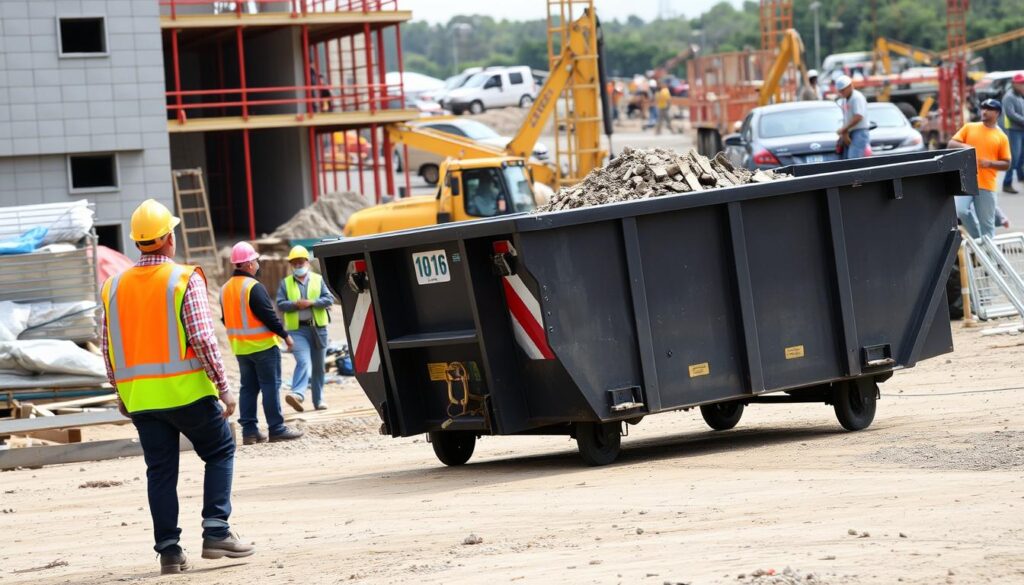
Simplifying the dumpster rental process, we guide you through every step, from delivery to pickup. Our streamlined process ensures that you can focus on your project without worrying about waste management.
Scheduling Your Delivery
To initiate the rental process, simply contact us to schedule a delivery time that suits your needs. We’ll deliver the dumpster to your specified location, ensuring it’s ready for use when you need it.
Rental Duration Options
Our rental durations are flexible, accommodating both short-term and long-term projects. Whether you’re undertaking a quick cleanup or a prolonged construction project, we have you covered.
Pickup and Disposal Procedures
Once you’ve filled the dumpster, just call us to arrange a convenient pickup time. Our team will then handle the disposal of the waste in an environmentally responsible manner, ensuring compliance with local regulations.
- When your project is complete and your dumpster is filled, simply call our office at (517)329-1234 to schedule a convenient pickup time.
- Prior to pickup, ensure that no items are extending above the container rim or hanging over the sides to prevent transportation issues.
- Our team will arrive promptly at the scheduled time to retrieve your dumpster with minimal disruption to your property.
- All collected waste is transported to appropriate processing facilities where recyclable materials are separated whenever possible to minimize environmental impact.
- After pickup, we handle all aspects of proper disposal according to local regulations, saving you the hassle of navigating complex waste management requirements.
Dumpster Placement Requirements and Considerations
To have a hassle-free dumpster rental, understanding the placement requirements is essential. Proper placement ensures safety, accessibility, and compliance with local regulations.
Space and Access Requirements
You need to ensure there’s enough space for the dumpster and that it’s accessible for delivery and pickup. Consider the width and height of the dumpster, as well as any obstacles like overhead wires or nearby structures.
Surface Considerations
The surface where the dumpster will be placed should be firm and level. Avoid soft ground or slopes, as they can cause the dumpster to tip or sink. If you’re placing it on asphalt or concrete, ensure it’s in good condition.
Permit Requirements for Street Placement
If you plan to place your dumpster on public property, such as a street, you may need a permit. Check with your local municipality for specific requirements, as they vary by location. Some areas require additional safety measures like reflective markings or barriers.
| Placement Consideration | Description |
|---|---|
| Space and Access | Ensure enough space and clear access for delivery and pickup. |
| Surface Condition | Choose a firm, level surface to prevent tipping or sinking. |
| Permit Requirements | Check if a permit is needed for street placement and comply with local regulations. |
Materials Accepted in Dumpster Rentals
To avoid any issues with your dumpster rental, it’s vital to understand what materials are permissible. Dumpster rentals have guidelines on accepted materials to ensure safe and compliant waste disposal.
Common Household and Construction Debris
Most dumpster rentals accept common household and construction debris, including wood, drywall, and roofing materials. These are typically non-hazardous and can be disposed of in standard dumpsters.
Special Material Considerations
Certain materials require special handling. For instance, appliances containing refrigerants, like air conditioners and refrigerators, need certified disposal. Similarly, automotive components such as tires and batteries require specialized disposal facilities.
Prohibited Items and Materials
It’s equally important to know what’s not allowed. Hazardous materials, including paints, solvents, and chemicals, are strictly prohibited. Other restricted items include mattresses, oils, fuels, propane tanks, and electronic waste like televisions and computers.
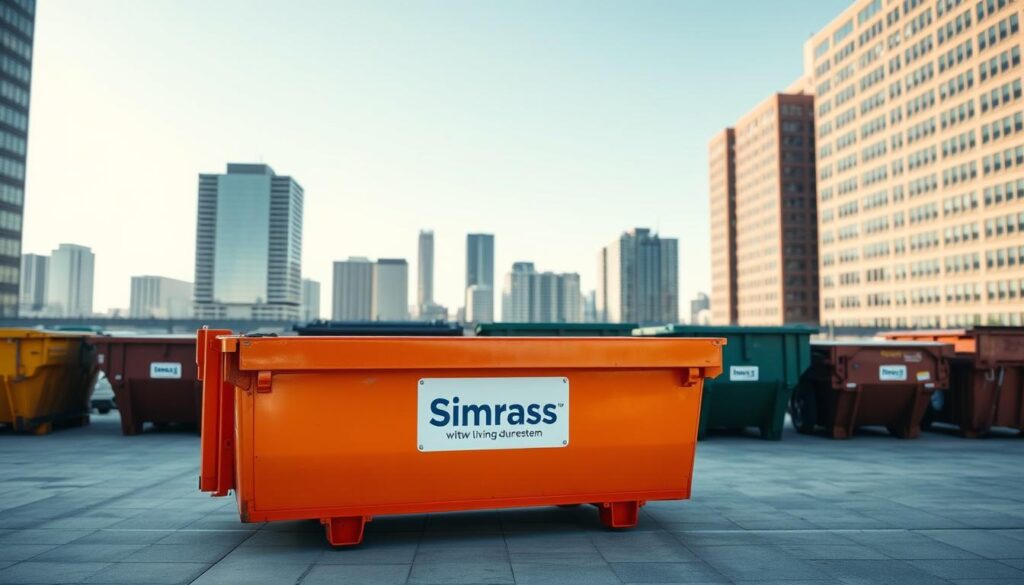
Specialty Dumpster Options for Specific Materials
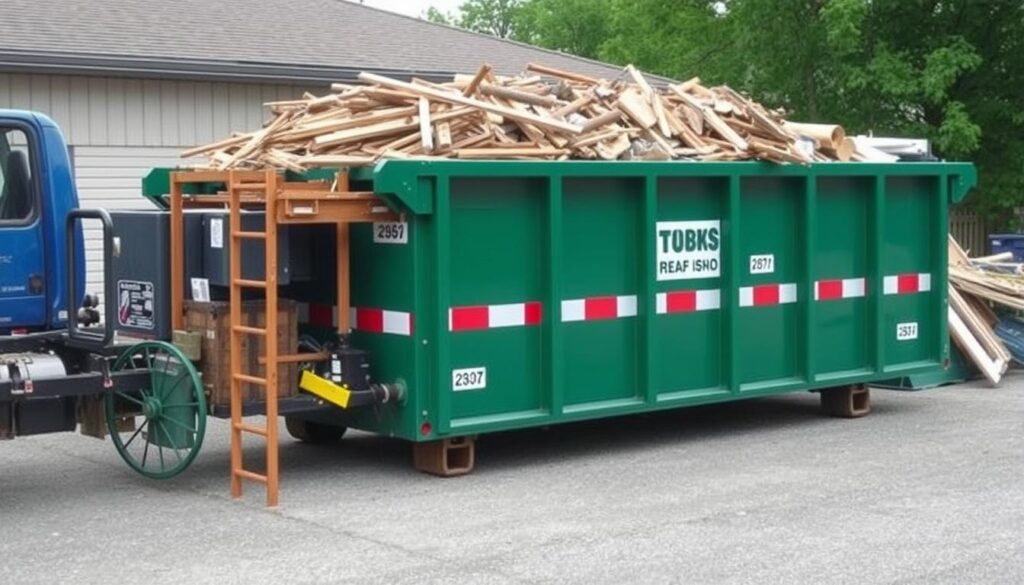
Specialty dumpsters are designed to handle unique waste materials, providing a tailored solution for various projects. These dumpsters cater to specific needs, ensuring efficient and safe disposal of distinct types of waste.
Concrete and Heavy Material Dumpsters
These dumpsters are reinforced to handle heavy materials like concrete, bricks, and rocks. They are ideal for construction and demolition projects where heavy debris is common.
Yard Waste Specific Containers
Yard waste containers are designed for organic materials such as leaves, branches, and grass clippings. They are perfect for yard cleanups and landscaping projects.
Roofing Material Dumpsters
Roofing dumpsters are specifically designed for disposing of roofing materials like shingles and felt paper. Key benefits include:
- Reinforced construction to handle heavy roofing debris
- Modified weight limits to accommodate dense materials
- Direct disposal to recycling facilities, reducing costs
- Prevention of mixing roofing materials with other waste, preserving recycling opportunities
By choosing the right specialty dumpster, you can ensure efficient and cost-effective waste disposal for your specific project needs.
Conclusion: Making Your Final Dumpster Size Decision
Making the right dumpster size decision is easier when you have the right information and support. When selecting a dumpster, consider both the volume and weight of your anticipated waste to ensure you choose the most cost-effective option.
Our experienced customer service team is available during business hours to answer any questions about your specific project needs. You can reach us at (517)329-1234 or visit us at 5501 S Cedar St, Lansing, MI 48911.
We strive to make the rental process simple, from initial contact through final pickup. Our goal is to provide you with the perfect dumpster size for your specific waste removal needs, with transparent pricing that includes delivery, pickup, and rental time, and no hidden fees. Call today to rent a roll-off dumpster that meets your needs.
